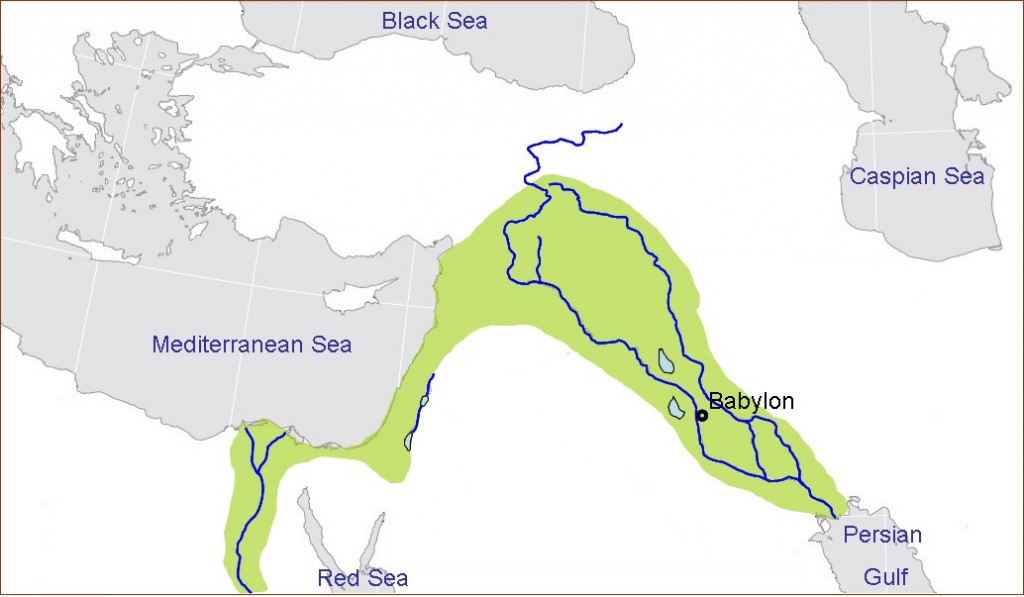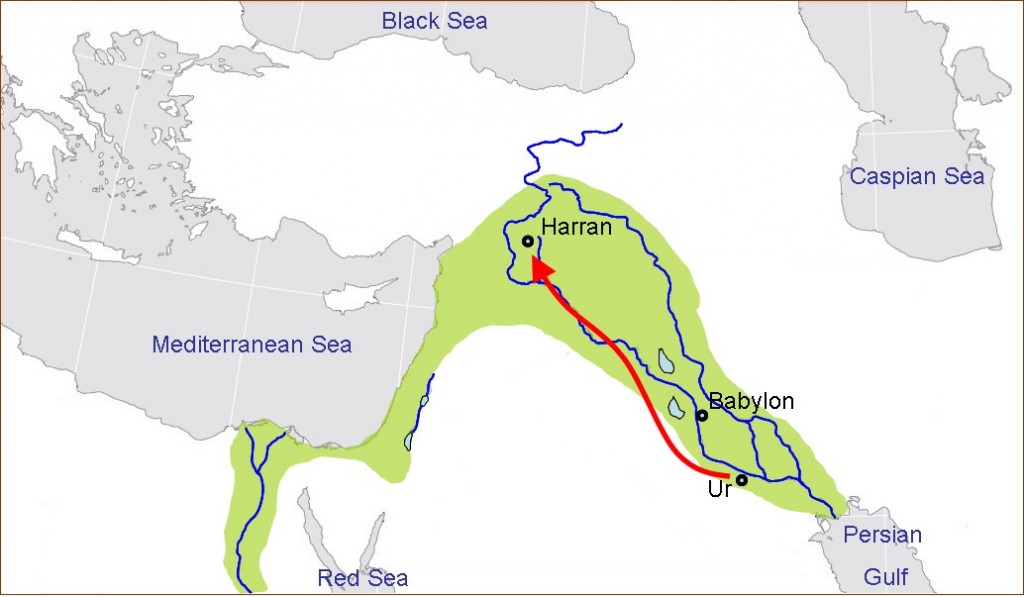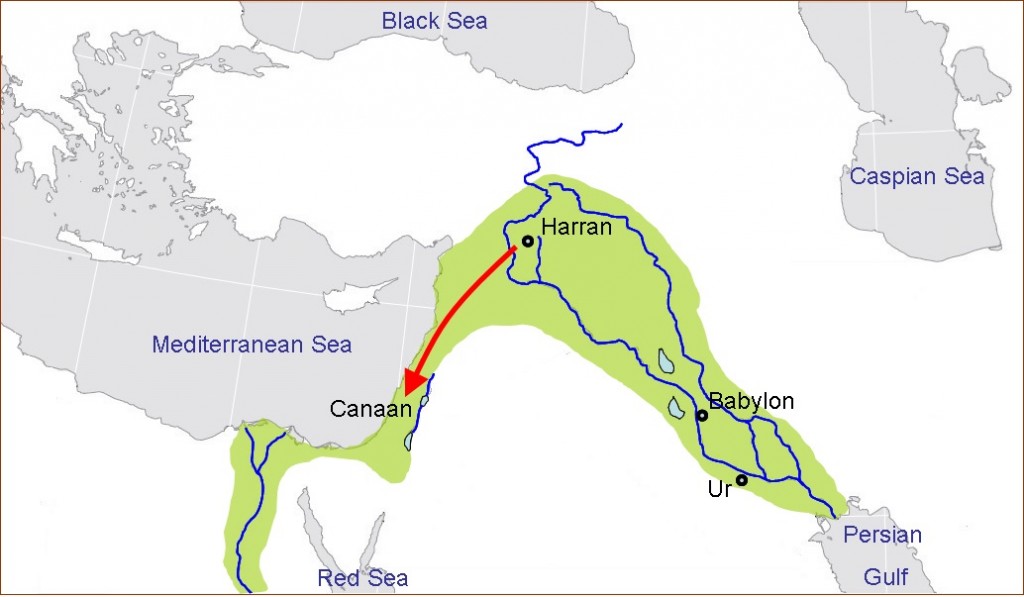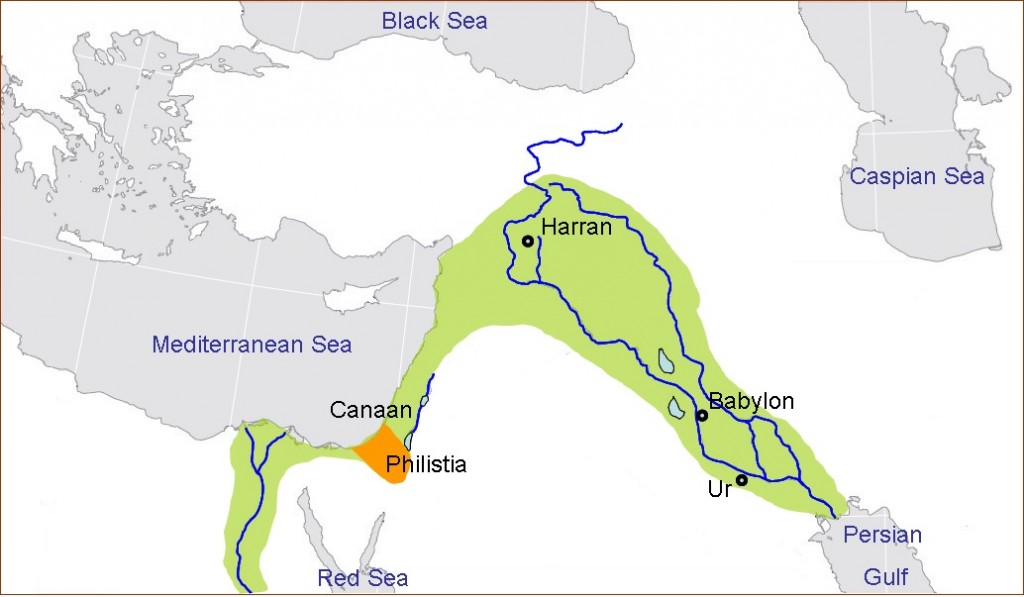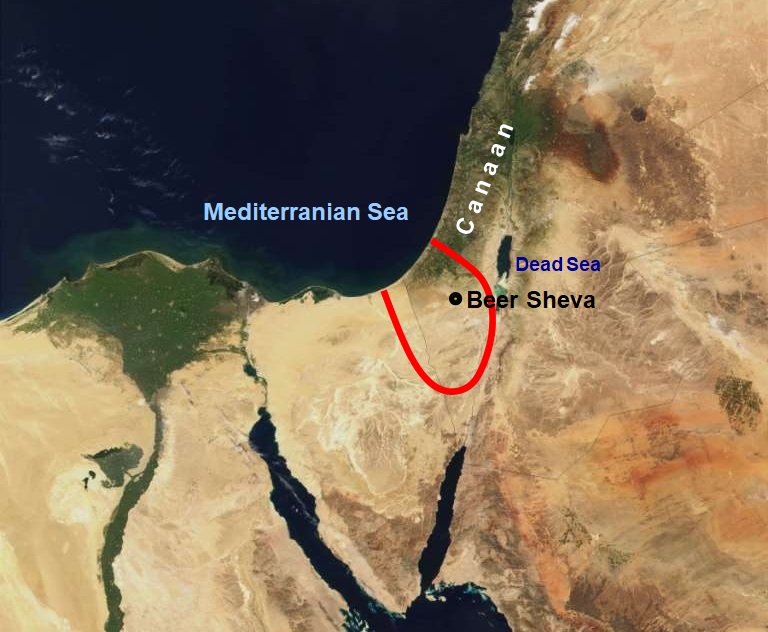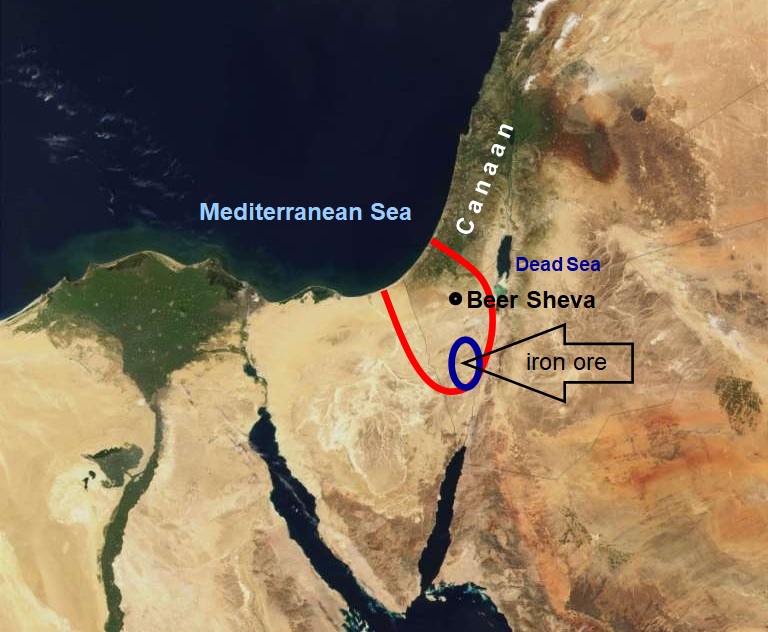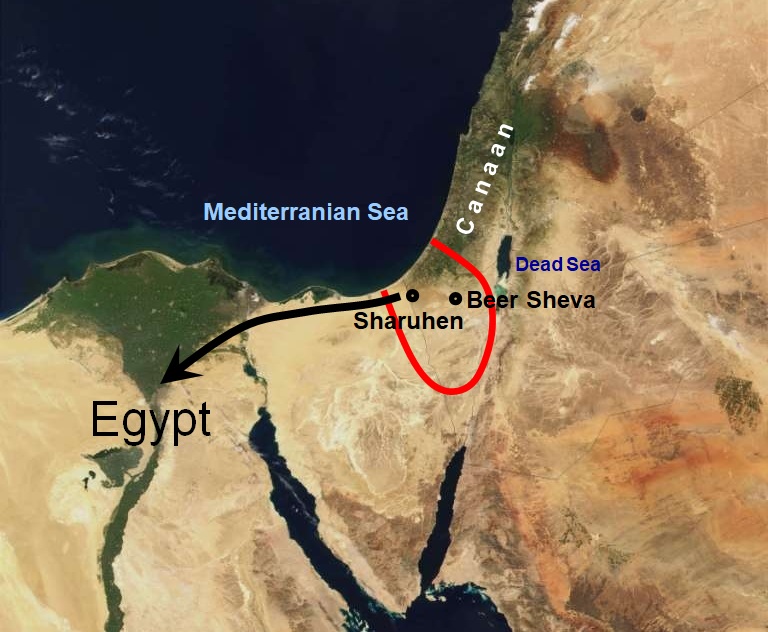This article is about why the forefather Abraham longed namely for Canaan and about the origin of the Pharaoh who sheltered Joseph in Egypt.
.
REVOLUTION No. 1
Many thousands of years ago EVERY person EVERY MINUTE thought only of one thing – where to find food. Those who did not find it died of hunger. People wandered over the Earth’s surface and searched for food, which was given to them by wild nature.
But the nature wasn’t generous. The food found at some place, as a rule, was sufficient only for one person. This did not allow people to unite in groups. Therefore, people were ALONE and were not able to interact in groups.
In the 3rd millennium BC the greatest of revolutions – agricultural – took place. The most talented people learned to CREATE, i.e. to grow food.
By the beginning of the 20th century BC, technologies for growing food spread throughout the territory of the “fertile crescent”. Therefore, it is called fertile.
Figure 01
The population of the fertile crescent was divided into two categories by the way of how they get food:
- creators of food,
- robbers of food, engaged in robbing food from nature and from creators.
.
REVOLUTION No. 2
The agricultural revolution gave birth to a settled way of life. A settled way of life cause the demand to build permanent dwellings. At first, creators built houses of stones that were collected in the neighborhood:
Figure 02
The most industrious of the creators used to chisel stones giving them a more or less correct form to improve the stability of the walls:
Figure 03
In the 20th century BC there was a revolution in the field of construction technologies. Creators learned to MANUFACTURE bricks – artificial building blocks of the same size and regular rectangular shape, allowing them to erect stable high walls.
תורה, ספר בראשית
יא,ג וַיֹּאמְרוּ אִישׁ אֶל רֵעֵהוּ הָבָה נִלְבְּנָה לְבֵנִים וְנִשְׂרְפָה לִשְׂרֵפָה וַתְּהִי לָהֶם הַלְּבֵנָה לְאָבֶן וְהַחֵמָר הָיָה לָהֶם לַחֹמֶר יא,ד וַיֹּאמְרוּ הָבָה נִבְנֶה לָּנוּ עִיר וּמִגְדָּל וְרֹאשׁוֹ בַשָּׁמַיִם וְנַעֲשֶׂה לָּנוּ שֵׁם פֶּן נָפוּץ עַל פְּנֵי כָל הָאָרֶץ יא,ה וַיֵּרֶד יְהוָה לִרְאֹת אֶת הָעִיר וְאֶת הַמִּגְדָּל אֲשֶׁר בָּנוּ בְּנֵי הָאָדָם יא,ו וַיֹּאמֶר יְהוָה הֵן עַם אֶחָד וְשָׂפָה אַחַת לְכֻלָּם וְזֶה הַחִלָּם לַעֲשׂוֹת וְעַתָּה לֹא יִבָּצֵר מֵהֶם כֹּל אֲשֶׁר יָזְמוּ לַעֲשׂוֹת יא,ז הָבָה נֵרְדָה וְנָבְלָה שָׁם שְׂפָתָם אֲשֶׁר לֹא יִשְׁמְעוּ אִישׁ שְׂפַת רֵעֵהוּ יא,ח וַיָּפֶץ יְהוָה אֹתָם מִשָּׁם עַל פְּנֵי כָל הָאָרֶץ וַיַּחְדְּלוּ לִבְנֹת הָעִיר יא,ט עַל כֵּן קָרָא שְׁמָהּ בָּבֶל כִּי שָׁם בָּלַל יְהוָה שְׂפַת כָּל הָאָרֶץ וּמִשָּׁם הֱפִיצָם יְהוָה עַל פְּנֵי כָּל הָאָרֶץ
Torah, Book 1 Genesis, Chapter 11
3 And they said one to another: ‘Come, let us make brick, and burn them thoroughly.’ And they had brick for stone, and slime had they for mortar. 4 And they said: ‘Come, let us build us a city, and a tower, with its top in heaven, and let us make us a name; lest we be scattered abroad upon the face of the whole earth.’ 5 And the LORD came down to see the city and the tower, which the children of men builded. 6 And the LORD said: ‘Behold, they are one people, and they have all one language; and this is what they begin to do; and now nothing will be withholden from them, which they purpose to do. 7 Come, let us go down, and there confound their language, that they may not understand one another’s speech.’ 8 So the LORD scattered them abroad from thence upon the face of all the earth; and they left off to build the city. 9 Therefore was the name of it called Babel; because the LORD did there confound the language of all the earth; and from thence did the LORD scatter them abroad upon the face of all the earth.
It seems that this episode in the Torah describes the first attempt in human history to build a tall brick building. The attempt failed – people did not find a common language, because they had not yet learned how to interact in the group, and drew apart.
.
REVOLUTION No. 3
Robbers continued to roam along the expanses of the fertile crescent in search of food. But now they knew that if they did not find it, they could steal it or rob it from the creators.
Creators began to cooperate among themselves in order to jointly defend themselves against robbers and settle in groups. A leap in the mental evolution of a man took place – the ability to coordinate the actions of people united in a group was developed.
In response, robbers began to organize gangs to attack creators.
The cleverest of robbers began to offer creators a protection for defense from other robbers. Of course, they charged a fee for the protection. Obviously, they used this fee to strengthen their gang and expand the territory of influence. In this way rulers, taxes and armies appeared. At this stage of development, a man acquired one of his main qualities – the ability to group logistics.
Here it should be noted that outside the fertile crescent, people continued to wander alone around the vast expanse, picking food in the wild.
.
THE GRASS IS ALWAYS GREENER ON THE OTHER SIDE
Fertile crescent was split into many small areas, each of which was governed by the local ruler. A continuous struggle took place among the rulers to expand the spheres of influence. It was a time of great concern to the creators.
Fleeing from incessant internecine wars, Terah and his family left Ur of the Chaldees for distant places – to the north of Mesopotamia to Harran. Probably at that moment the wave of violence had not yet reached Harran.
תורה, ספר בראשית
יא,לא וַיִּקַּח תֶּרַח אֶת אַבְרָם בְּנוֹ וְאֶת לוֹט בֶּן הָרָן בֶּן בְּנוֹ וְאֵת שָׂרַי כַּלָּתוֹ אֵשֶׁת אַבְרָם בְּנוֹ וַיֵּצְאוּ אִתָּם מֵאוּר כַּשְׂדִּים לָלֶכֶת אַרְצָה כְּנַעַן וַיָּבֹאוּ עַד חָרָן וַיֵּשְׁבוּ שָׁם
Torah, Book 1 Genesis, Chapter 11
31 And Terah took Abram his son, and Lot the son of Haran, his son’s son, and Sarai his daughter-in-law, his son Abram’s wife; and they went forth with them from Ur of the Chaldees, to go into the land of Canaan; and they came unto Haran, and dwelt there.
Figure 04
In 1839 BC (refer to the article “Chronology of the Fathers”), the forefather Abram (at that time he had not changed his name to Abraham yet) decided to become separated from Terah and to move from Harran to Canaan.
תורה, ספר בראשית
יב,ה וַיִּקַּח אַבְרָם אֶת שָׂרַי אִשְׁתּוֹ וְאֶת לוֹט בֶּן אָחִיו וְאֶת כָּל רְכוּשָׁם אֲשֶׁר רָכָשׁוּ וְאֶת הַנֶּפֶשׁ אֲשֶׁר עָשׂוּ בְחָרָן וַיֵּצְאוּ לָלֶכֶת אַרְצָה כְּנַעַן וַיָּבֹאוּ אַרְצָה כְּנָעַן
Torah, Book 1 Genesis, Chapter 11
5 And Abram took Sarai his wife, and Lot his brother’s son, and all their substance that they had gathered, and the souls that they had gotten in Haran; and they went forth to go into the land of Canaan; and into the land of Canaan they came.
Figure 05
Abram’s decision was caused by purely pragmatic considerations:
- firstly, a wave of internecine wars reached Harran and life there became as unbearable as it was in Ur of the Chaldees.
- secondly, there were rumors that somewhere in Canaan, life was calm and there were no wars.
.
ALL AGAINST ALL
Having reached Canaan, Abram found there the same situation of enmity, as in other regions of the fertile crescent.
In the Torah, in the Book of Genesis, in Chapter 14, the story of the armed conflict is described, in which nine local kings participated – five against four. The army which won in this battle was eventually defeated by the forefather Abram and his 318 slaves. Probably, the total number of people who took part in this conflict did not exceed a thousand people. This allows us to make an assumption about the small population in Canaan at that time.
Moving to the south, Abram reached the goal of his journey – the land of the Philistines.
Figure 06
.
ABIMELECH AND PHICOL
In the Philistine country, Abimelech, mentioned in three episodes in the Torah, ruled.
Episode No.1: even before Sarah’s pregnancy Abimelech was tempted by her, however, then repented and gave her back to Abraham.
Episode No.2: a few years after the birth of Yitzhak Abimelech and Abraham concluded the friendship treaty:
תורה, ספר בראשית
כא,לא עַל כֵּן קָרָא לַמָּקוֹם הַהוּא בְּאֵר שָׁבַע כִּי שָׁם נִשְׁבְּעוּ, שְׁנֵיהֶם כא,לב וַיִּכְרְתוּ בְרִית בִּבְאֵר שָׁבַע וַיָּקָם אֲבִימֶלֶךְ וּפִיכֹל שַׂר צְבָאוֹ וַיָּשֻׁבוּ אֶל אֶרֶץ פְּלִשְׁתִּים כא,לג וַיִּטַּע אֶשֶׁל בִּבְאֵר שָׁבַע וַיִּקְרָא שָׁם בְּשֵׁם יְהוָה אֵל עוֹלָם כא,לד וַיָּגָר אַבְרָהָם בְּאֶרֶץ פְּלִשְׁתִּים יָמִים רַבִּים
Torah, Book 1 Genesis, Chapter 21
31 Wherefore that place was called Beer-sheba; because there they swore both of them. 32 So they made a covenant at Beer-sheba; and Avimelech rose up, and Phicol the captain of his host, and they returned into the land of the Philistines. 33 And Abraham planted a tamarisk-tree in Beer-sheba, and called there on the name of the LORD, the Everlasting God. 34 And Abraham sojourned in the land of the Philistines many days.
Episode No.3: conclusion of the friendship treaty between Abimelech and Isaac, the son of Abraham.
תורה, ספר בראשית
כו,כו וַאֲבִימֶלֶךְ הָלַךְ אֵלָיו מִגְּרָר וַאֲחֻזַּת מֵרֵעֵהוּ וּפִיכֹל שַׂר צְבָאוֹ כו,כז וַיֹּאמֶר אֲלֵהֶם יִצְחָק מַדּוּעַ בָּאתֶם אֵלָי וְאַתֶּם שְׂנֵאתֶם אֹתִי וַתְּשַׁלְּחוּנִי מֵאִתְּכֶם כו,כח וַיֹּאמְרוּ רָאוֹ רָאִינוּ כִּי הָיָה יְהוָה עִמָּךְ וַנֹּאמֶר תְּהִי נָא אָלָה בֵּינוֹתֵינוּ בֵּינֵינוּ וּבֵינֶךָ וְנִכְרְתָה בְרִית, עִמָּךְ כו,כט אִם תַּעֲשֵׂה עִמָּנוּ רָעָה כַּאֲשֶׁר לֹא נְגַעֲנוּךָ וְכַאֲשֶׁר עָשִׂינוּ עִמְּךָ רַק טוֹב וַנְּשַׁלֵּחֲךָ בְּשָׁלוֹם אַתָּה עַתָּה בְּרוּךְ יְהוָה
Torah, Book 1 Genesis, Chapter 26
26 Then Avimelech went to him from Gerar, and Ahuzzath his friend, and Phicol the captain of his host. 27 And Isaac said unto them: ‘Wherefore are ye come unto me, seeing ye hate me, and have sent me away from you?’ 28 And they said: ‘We saw plainly that the LORD was with thee; and we said: Let there now be an oath betwixt us, even betwixt us and thee, and let us make a covenant with thee; 29 that thou wilt do us no hurt, as we have not touched thee, and as we have done unto thee nothing but good, and have sent thee away in peace; thou art now the blessed of the LORD.’
In episode No. 3, Abimelech behaves as if he is not familiar with Isaac and never heard of him, and this is despite the unforgettable events described in episodes No. 1 and No. 2 which took place more than 100 years ago.
Explanation:
- Avimelech and Phichol in episode No. 2 and Avimelech and Phichol in episode No. 3 are different people.
- Avimelech and Phichol are not names, they are forms of especially respectful address, like addressing the king – Your Majesty. In other words, the phrase “And Abimelech rose up, and Phichol the captain of his host, and returned into the land of the Philistines” would now sound like this: “And His Majesty rose up, and His Excellency the captain of His Majesty’s host, and returned to the land of the Philistines”.
The word אֲבִימֶלֶךְ in Hebrew consists of two words: אֲבִ + מֶלֶךְ. In translation it means “Father-King”. Not just “King”, but “Father-King”!
Why did this man earn the right to be addressed by the title of Father-King?
In those troubled times, when all were at war with all, this man managed to curb the surrounding kings, extend his influence over a vast territory, and create an atmosphere of peaceful coexistence and feeling of unanimity for the population at this territory. As a token of gratitude and respect, he received the honorable nickname of father of kings = Father-King from people.
.
THE PHILISTINES
As stated above, Abimelech captured a vast territory.
Capture of territory → (Hebrew) פלישה [plisha].
The captured territory → (Hebrew) פלשת [peleshet].
People living in the captured territory → (Hebrew) פלישתים [plishtim].
The word “Philistines” came in English from Hebrew through Greek:
(Hebrew) פלשתים [plishtim] → (Greek) Φιλισταίοι [philistei] → (English) Philistines.
תורה, ספר בראשית
כא,לג וַיִּטַּע אֶשֶׁל בִּבְאֵר שָׁבַע וַיִּקְרָא שָׁם בְּשֵׁם יְהוָה אֵל עוֹלָם כא,לד וַיָּגָר אַבְרָהָם בְּאֶרֶץ פְּלִשְׁתִּים יָמִים רַבִּים
Torah, Book 1 Genesis, Chapter 21
33 And he planted a tamarisk-tree in Beer-sheba, and called there on the name of the LORD, the Everlasting God. 34 And Abraham sojourned in the land of the Philistines many days.
This verse of the Torah tells us that Abraham reached the goal of his journey from Harran to Canaan and settled in the land of the Philistines, the only place where the peace reigned in those days.
Figure 07
.
THE BEGINNING OF THE IRON AGE
There were no wars in the land of the Philistines. Previously disunited groups of the population felt like a united people. Residents were able to develop the peaceful technologies of agriculture, irrigation systems and construction. Here, for the first time in the history of mankind, the production of iron tools from ore was mastered. Ore was mined nearby – in the vicinity of the gorges פארן [paran] and נקרות [nekarot].
Figure 08
The Iron Age of mankind began in the Negev in the 19th or 18th century BC, and not in the 12th century BC, as it is customary to assert (read the article “The Beginning of the Iron Age“).
.
THE HYKSOS
The following is known about the Hyksos:
- the word “Hyksos” is Greek which originated in the 6th – 5th centuries BC, archeology does not mention the way they called themselves;
- the Hyksos came to Egypt around 1750 BC;
- the Hyksos arrived in Egypt on two-wheeled chariots, armed with iron swords, daggers, helmets and shields;
- the Hyksos brought the technology of producing iron objects from ore to Egypt;
- the Torah provides details on the events that took place in Canaan in the mid-18th century BC, but there is no evidence of the movement of any military formations through Canaan towards Egypt;
-in the records of Pharaoh Ahmose I it is mentioned that the Hyksos, ousted from Egypt in 1550 BC, fled to the town of Sharuhen, which was about 20 km away to the south of the city of Gaza. Why did they escape to Sharuhen? The answer is simple: they fled to their home.
Conclusion:
- the Hyksos are the Philistines who brought the technology of iron producing to Egypt;
- the Hyksos are the Philistines from Sharuhen, so on the way to Egypt they did not need to cross Canaan.
Figure 09
The information that the people of Sharuhen were Egyptian pharaohs is also confirmed by the fact that local Arab residents even today call Sharuhen by the name تل الفارعة [Tel el-Far’a] = Pharaoh’s Hill. But no one told them about Hyksos!
.
JOSEPH IN EGYPT
One more important sign that the Hyksos were the Philistines is the story of Joseph’s relationship with Pharaoh.
Since acquaintance between Abraham and Abimelech in 1815 BC (see the article “Chronology of the Fathers”) and before the meeting of Joseph with Pharaoh in 1631 BC, almost 200 years of successful coexistence of Abraham’s family and his descendants with the Philistines passed. This explains the warm attitude of Pharaoh who was the Philistine towards Joseph and his family.
תורה, ספר בראשית
מז,ה וַיֹּאמֶר פַּרְעֹה אֶל יוֹסֵף לֵאמֹר אָבִיךָ וְאַחֶיךָ בָּאוּ אֵלֶיךָ מז,ו אֶרֶץ מִצְרַיִם לְפָנֶיךָ הִוא בְּמֵיטַב הָאָרֶץ הוֹשֵׁב אֶת אָבִיךָ וְאֶת אַחֶיךָ יֵשְׁבוּ בְּאֶרֶץ גֹּשֶׁן
Torah, book Genesis, Chapter 47
5 And Pharaoh spoke unto Joseph, saying: ‘Thy father and thy brethren are come unto thee; 6 the land of Egypt is before thee; in the best of the land make thy father and thy brethren to dwell; in the land of Goshen let them dwell.
.
THE PHILISTINES AMONG THE PEOPLES OF THE SEA
After 430 years after the events described above, the people of Israel left Egypt. Peoples of the Sea rendered him military assistance in this action (see the article “Exodus: Behind the Scenes”). In the records of Pharaoh Ramesses IV (see the Great Harris Papyrus), five names of Peoples of the Sea are mentioned. Among them is the name P-L-SH-T = (Hebrew) פלשת [peleshet], i.e. the Philistines.
.
THE PHILISTINES AND THE JEWS
The friendship of the Jews and the Philistines from the moment of the acquaintance of the forefather of Abraham with Abimelech nearly in 1815 BC and by the time of the invasion of the Jews into the Promised Land in 1154 BC (see the article “Chronology of the Fathers”) totaled around 660 years.
After the Jews’ invasion into the Promised Land, these relations developed in different ways – there were periods of friendship and tension. The main reason for the contradictions was that the Jews became monotheists for 40 years in Sinai, and the Philistines, having mixed with the Achaeans, remained pagans (see the article “Where is Hercules buried?” and “Full Circle”).
There are other articles on this site. A list of them here

